Welcome to my blog
Grow & Scale A Business That Will Set You Free
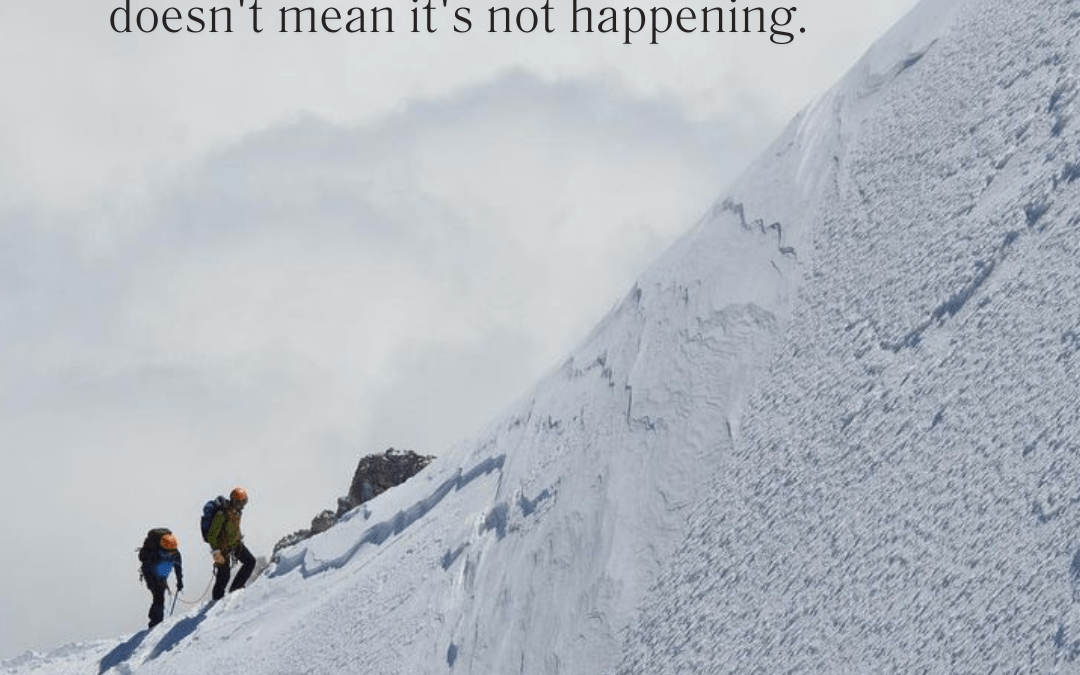
The Seasons of Things
I love ice climbing on frozen waterfalls. Often you can hear the water rushing underneath. You can almost sense the motion. It feels alive.

But what happens when you can’t sense the motion? What then?
I received an email from a coaching client late last week. She felt frustrated. She’d made a lot of progress in 2023; scored a lot of victories. Now, though, she said, she couldn’t see much forward progress. She felt like she’d lost momentum.
I wondered aloud whether it was just the season of things.
The late great thought leader Jim Rohn spoke of the seasons of change; the seasons of our lives that always come; those seasons that always repeat themselves. The rhythm of things. The springtime of planting and new life; the summer of cultivation and care; the fall of reaping and the harvest; the winter of darkness, contemplating and planning.
The seasons of things. Interconnected. Locked in balance. Necessary one to the other.
I look outside my window at winter’s frozen landscape here in the northeast. There doesn’t seem to be much of anything going on. But I know on some particularly warm day, not many weeks from now, flowers will bolt from the ground. And spring will be here.
Not by accident. Not without the work of winter.
Spring doesn’t just happen. Stuff’s going on in the ground even now.
Momentum. Just unseen.
I asked my client whether she was continuing to do the work… attending to her daily practices; whether she was ‘showing up’ even though she didn’t ‘feel the love.’
“Of course,” she said. Which was the right answer. (At least as far as her coach was concerned.)
Because, as I’ve written many times, it is the showing up, even in the face of failure – and especially when we can’t see the progress – that matters most.
The small, tiny, incremental, perhaps imperceptible, steps over time. The ultra-marathon of life.
We might say we hate the winter. But the winter always comes.
And so the spring.
I told my client (and myself): Do the work. Keep at the work.
Hold fast the vision.
And trust more.
Just trust. In the rhythm of things.
_____________________________________________________________________
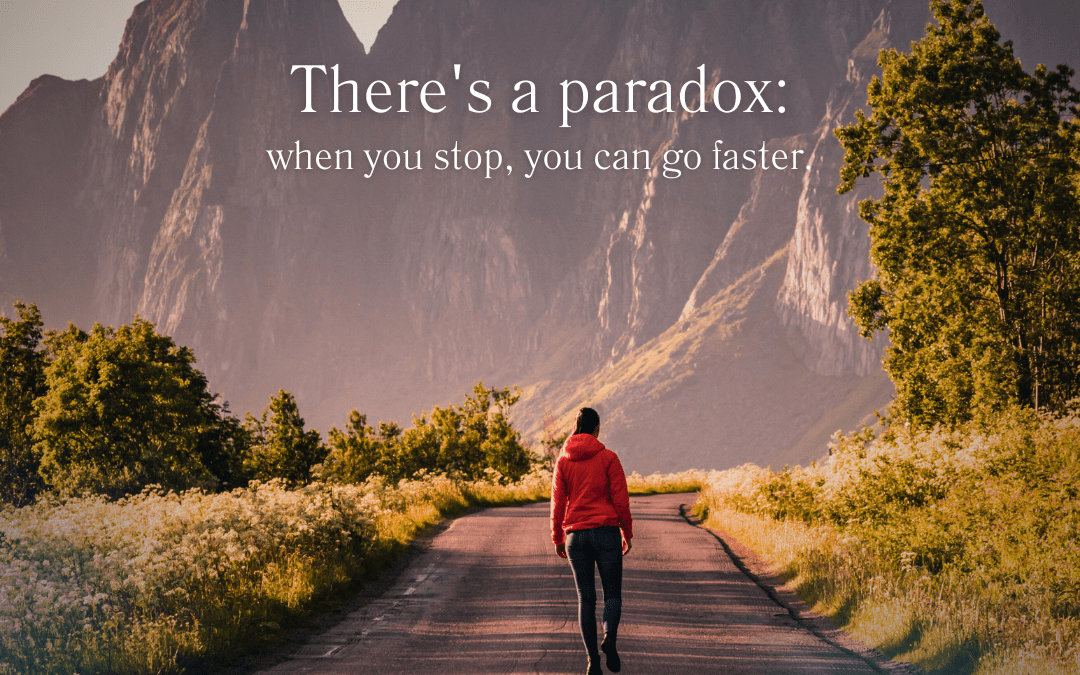
All You Need To Do Is Stop
In life itself, there is a time to seek inner peace, a time to rid oneself of tension and anxiety. The moment comes when the striving must let up, when wisdom says, “Be quiet.” You’ll be surprised how the world keeps on revolving without your pushing it. And you’ll be surprised how much stronger you are the next time you decide to push.”
— John Gardner
I was moving forward at warp speed. As I do.
Then I stopped.
Not because I really wanted to. But because I had promised myself I would.
I returned once again last week to a remote retreat. To rest; to re-create; to renew. (I set as my intention to do this four times a year.)
Going off the grid can be tough duty for an achievement and adrenaline junkie like me.
But what I know for sure is that the stopping is essential to the going.
We – all of us – are bombarded by inputs, demands, and expectations. We’re inundated with voice mails and text messages, emails, and faxes. Everyone and everything competes for our attention. And with our “smart” phones, we’re always “on.”
One day melds into the next as we labor under our self-imposed illusions that if we can but accomplish just a little bit more, pack in just a little bit more, respond to just one more request, satisfy just one more client, cart the child just one more place, complete one more task, then we’ll be able to rest.
Culturally – and individually – we’re weary. At the end of the day, most of us feel worn pretty thin.
We forget how important – how essential – renewal is.
Rest days are a key component of high-altitude mountaineering. Recovery is a critical piece of athletic training.
Bears hibernate; trees go dormant. The natural world knows how to rest. The seasons have a rhythm to them. We not so much.
We keep on pushing on.
I finished on wonderful book while on retreat: Life Entrepreneurs by Christopher Gergen and Gregg Vanourek. It resonates so profoundly with the work I do: empowering extraordinary living. Its essential message: “We can fashion a life that is purposeful, self-directed, and aligned with who we truly are – providing us with opportunities for challenge, contribution, and fulfillment.” We get to design our lives. We get to choose.
It’s a hard-driving book filled with fascinating profiles of highly successful, remarkably creative leaders, innovators, and entrepreneurs. It explores all of the nuances of extraordinary lives. And it captures a core component of success, one overlooked by nearly all gurus, coaches, and achievement “experts:” the need to stop; to renew; to re-create.
Speed kills. “We ignore the basics of our physical, mental, emotional, and spiritual well-being at our own peril.” Make renewal “a cherished habit,” the authors say.
Not all of us need to go off the grid to a monastery for a week at a time (although I highly recommend it!). But there are practices and “habits” that you could explore that might allow for some breathing room. Here are some things that you might want to try:
- Turn off your electronics for a day (or even just an hour!)
- Explore a regular mediation practice
- Take a yoga class
- Do some aerobic exercise every day
- Walk in the woods or along the shore
- Avoid your email in-box in the morning
- Work in block time to avoid the interruptions
- Don’t multi-task (it doesn’t really work anyway)
- Take regular vacations, long weekends, and mental health days
- Learn to say ‘no’ more often
Even the smallest of self-care practices will make life sweeter.
The authors of Life Entrepreneurs remind us what John Muir once said: “I only went out for a walk and finally concluded to stay out till sundown, for going out, I found, was really going in.”
When you go in, you’ll find how much more there is of you to step out with – to share with the world.
All you need to do is stop.


Off The Tracks
This is the end of the line for most folks. This is where the cart goes off the track.
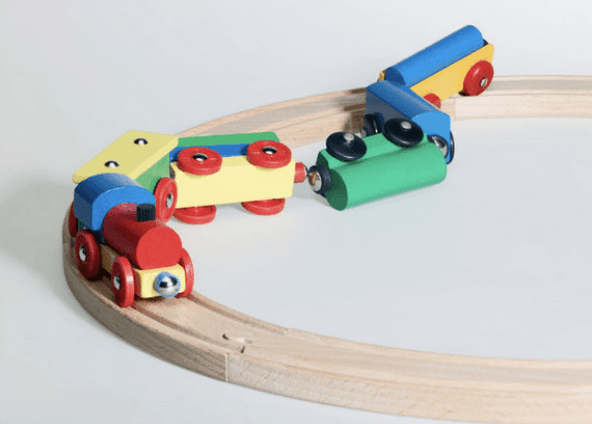
Despite the most heartfelt resolutions, despite whatever the best intentions might have been, most folks give up on their New Year’s promises to themselves… right about now.
Not because they didn’t mean what they said.
Not because they didn’t want to change… because they did.
Not because they don’t have dreams for a better life… because they do.
But because life gets in the way.
I know. I was a single dad for a dozen years raising three young boys. I would get up (too late) in the morning, run around getting dressed, getting the kids up, finding the lost socks, and the lost homework, making the lunches, packing the lunches, unpacking and re-packing the back-packs, running the kids to school, tearing off to my office, arriving (too) late to gather up my files, speeding off to court, tying my tie in the rearview mirror and balancing the coffee in my lap (and spilling it), getting the call from daycare to come back because the kid had a 103º fever or head lice or both, scheduling parent-teacher meetings in between client calls, rushing off to soccer practice, making dinner, mitigating the fights, helping with the homework, returning emails and phone calls, and falling into bed exhausted and depleted… only to wake up the next day and do it all over again.
I know.
But change can happen. (I know this too.) What you really, really want in your heart matters. Your hopes, dreams, and aspirations matter. They are the call of your Spirit, the Divine within you, to live your best life; to share those gifts that are yours and yours alone to share with the world in the most perfect way possible.
And it’s not too late. (It’s never too late.) Yes, January may be over. But the canvas of this New Year still awaits you.
Here’s what’s true: All you need to do is apply a very basic success principle, one of the easiest of all success principles. Take tiny, tiny steps.
- At just 1 pound a week, you’ll still lose more than 40 pounds this year
- At just 1 page a day, you’ll have well over 300 pages for your book
- At just 1 watercolor a week, you could mount an entire show
- One job application a day is 30 in a month
- One extra sales conversation every single day might double your sales
Take that tiny step today. Just for today. And then do it again. And again the next day. Small steps magnified by time leading to magnificent results.
But today, just think about this day. And take just one tiny step forward.
Remember, races are run one stride at a time; businesses built one product at a time, one customer at a time, one sale at a time; mountains are climbed one step at a time; novels written one sentence at a time; symphonies written one measure at a time; and cathedrals built over generations one stone at a time.
Go back to the beginning of the year, and remember why it was that you wanted to set out on your path. Reclaim that grand vision of that perfect life that is yours.
In every moment of danger, there is also opportunity.
Opportunity still waits for you.
____________________________________________________________________
If you’d like help getting your cart back on the track, email me: walt@walthampton.com

Be Like Flaco
He captured their hearts; grabbed their attentions; and piqued their imaginations.
Why?
Because Flaco broke free.

Flaco. The Owl. Who lived in the Central Park Zoo.
Until, a vandal cut a hole in the wire mesh of his enclosure.
And out Flaco flew.
There was a great outpour of consternation at first.
Flaco looked pretty scared and tentative.
He had a hard time with the whole flying thing.
Because after all, he’d lived in a tiny cage nearly all of his life.
He was fat, and out of shape.
And didn’t have any clue how to find food.
People worried that New York wouldn’t be kind to this wayward bird; that Flaco would get lost or hurt or die of starvation.
But within two weeks, Flaco got strong.
Floco has been out free for a year now.
He flies quite well; like an owl!
And appears quite confident; indeed, dare I say, happy.
Because Flaco is free.
And isn’t that what you want?
To break free of the drudgery, the grind, the mundane, the run-of-the-mill.
To get out from underneath the constant hustle, the debt, the hermetically sealed office, the deluge of social media, the non-stop onslaught of text messages, notifications, and alerts.
To become unencumbered of responsibilities; unfettered of the expectations of others.
Unchained.
Uncaged.
Free.
Finally free.
Is that a pipe dream?
A thing that only owls get to do?
I say not!
Oh sure, you’ve got responsibilities.
A job. A family. Groceries. A house or apartment. Bills to pay.
I get it.
I was a single dad who raised three boys on his own, for a dozen years, while managing a law firm and endeavoring to keep my shit together.
But you can take small steps toward freedom;
- Carving out oases of time for yourself;
- Keeping yourself healthy and well;
- Avoiding the siren call of more stuff;
- Eschewing credit card debt;
- Taking long weekends; and mini-vacations.
And, the most important of all: create work that gives you a great life.
Way too often, I see people try to cram life into the cracks and crevices of 60-hour work weeks. Which is to say, too many people live just to work. I say, build the work – craft it mindfully and intentionally – so that it is the vehicle for your amazing life.
I say: Be Flaco.
You Will See Tigers
“I’m going to stop working in five years,” Peter said. “After I’ve finished paying for my son’s law school tuition.” (This after Peter told me that the average lifespan of a trial lawyer is 57. Peter, a trial lawyer, was 55.)
“I’m going to start the fitness program as soon as my son starts kindergarten.”
“I’m going to go back for my degree when my youngest is out of college.”
“We’re going to take the trip to France right after I finish the next project.”
“I can’t take time off this year; we’re down a staff member.”
“If the house didn’t need painting this year, we’d get away to the Cape.”
“If I could just find a new job and a fresh place to live, I could get out of this crappy relationship.” (This more than six months after we first had this conversation.)
“Before I do the product launch, I need to take the copywriting course and learn SEO.”
“I’m going to finish the book (really I am), but right now I just don’t have the time.”
As a coach, I hear every story there is about why it is that now is not the right time, the auspicious time, the convenient time to do what we feel called to do, drawn to do, really want to do; to do what makes our hearts sing, our spirits soar.
Perhaps out of fear (of success or failure), or convention (what will people think?) or inertia or resistance, we create (artificial) barriers to the lives we really want to live; we imagine forces that must be fought and overcome before we do what really makes us happy. We imagine tigers that must be slain.
I love that old Buddhist story of the monk who is being chased through the jungle by tigers. He comes to the edge of a cliff as the tigers close in behind him. A hundred feet below, six more tigers claw at the base. The monk jumps from the cliff and on his way down grabs for a vine to stop himself. As he hangs by the vine, he sees a mouse gnawing at it. And just in that moment, he spies a fresh ripe strawberry growing out from the cliff face. The monk plucks the strawberry, tastes it and revels in its sweetness. ”My how good this is,” he says.
Here is the truth: Now is all we have. Now is the only moment in which we can create the lives we want to live.
As I write in Journeys, “dreams delayed are dreams denied.”
When we defer the call of our souls, we get angry and sad and bitter and resentful.

And the reality is, a step in the direction of our dreams usually doesn’t require a whole lot of time or a ton of resources or monumental change. We don’t need to throw the baby (or the husband) out with the bathwater. The step forward can be a tiny one.
And then another.
Do what you’ve always dreamed of doing.
Do it now.
There is no time to waste.
There will always be tigers.
______________________________________________________
When you’re ready to banish the tigers and create something new, let’s talk. Email me: walt@walthampton.com
DOWNLOAD your FREE BOOK!
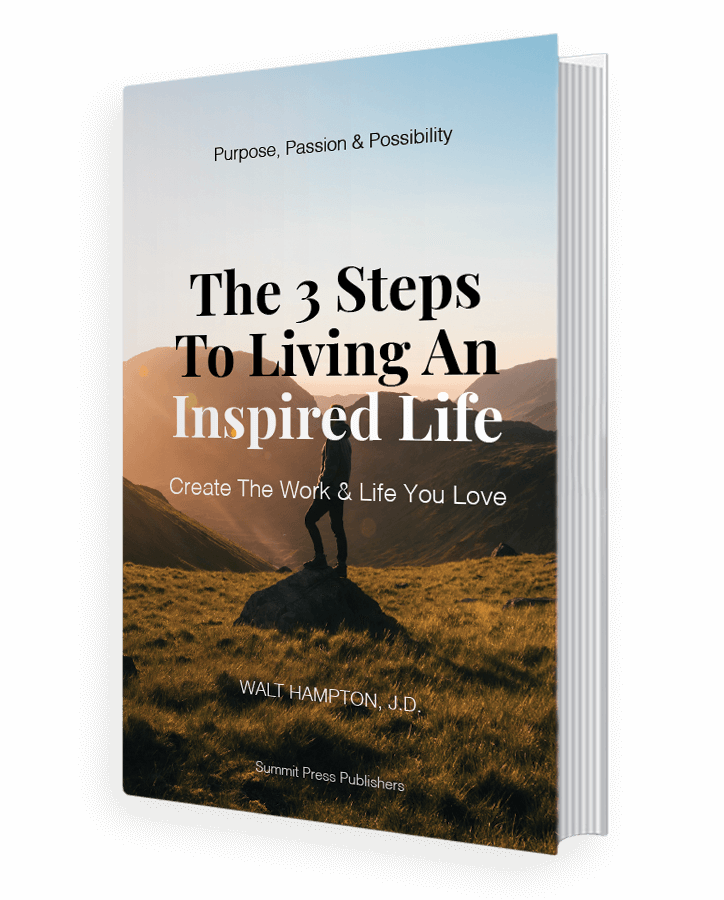
DOWNLOAD Your Free E-Book NOW! Click Below And Get Going!
Click below for your copy of Journeys!
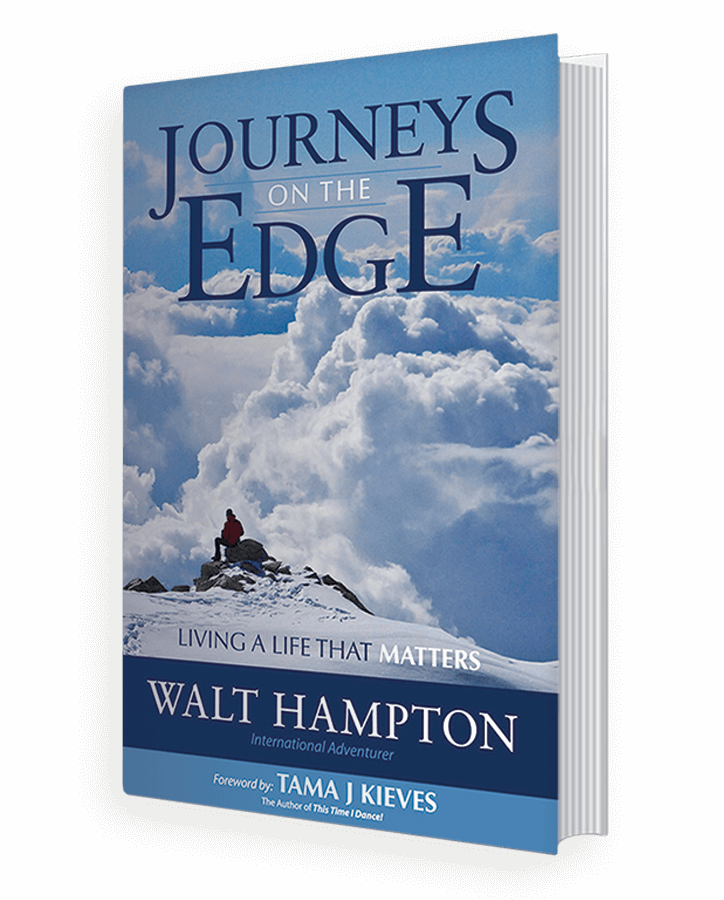
You’ll Get A Signed Copy!
Click on the button for your copy of my brand new book “The power principles of time mastery!”
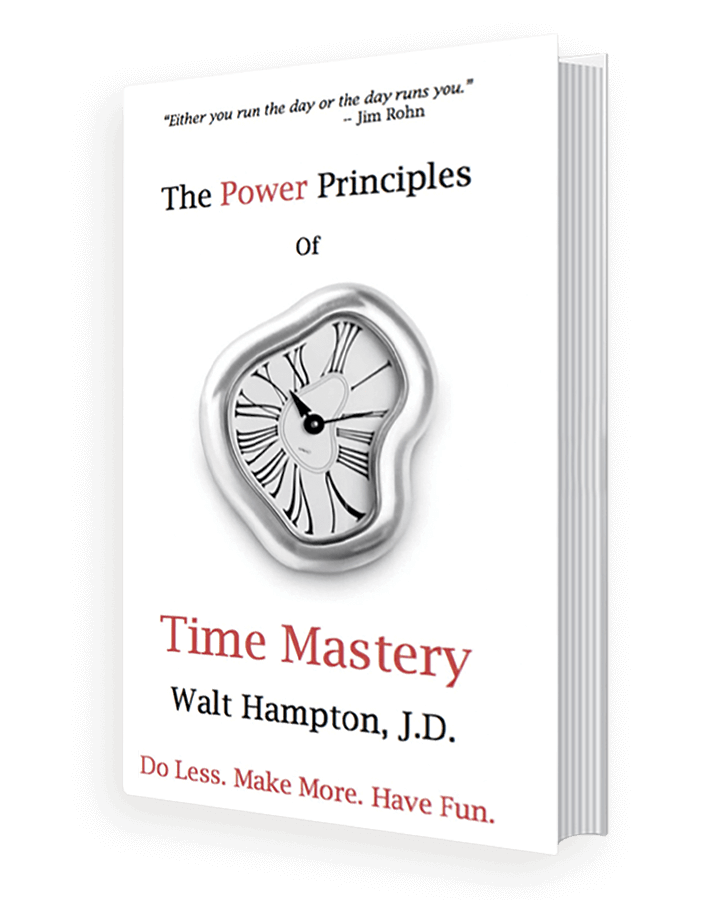
You’ll Get A Signed Copy!
Categories
Adventure
Finding The Way
Journeys
Leadership
Success
Ultra Training
